Organisational Behaviour: Culture, Motivation Theories & Team Dynamics
VerifiedAdded on 2022/11/30
|12
|3604
|110
Report
AI Summary
This report provides an in-depth analysis of organisational behaviour, focusing on the impact of culture, politics, and power on individual and team performance within the context of Asda, a major supermarket chain. It explores different types of organisational cultures, the negative effects of workplace politics, and the role of power dynamics in management. Furthermore, the report evaluates content and process theories of motivation, such as Maslow's hierarchy of needs and Vroom's expectancy theory, and their application in motivating employees to achieve organisational goals. The characteristics of effective versus ineffective teams are also examined, highlighting the importance of problem-solving and virtual teams. Finally, the report applies these organisational behaviour concepts to provide a comprehensive understanding of how Asda can optimise its workplace environment and enhance employee performance.
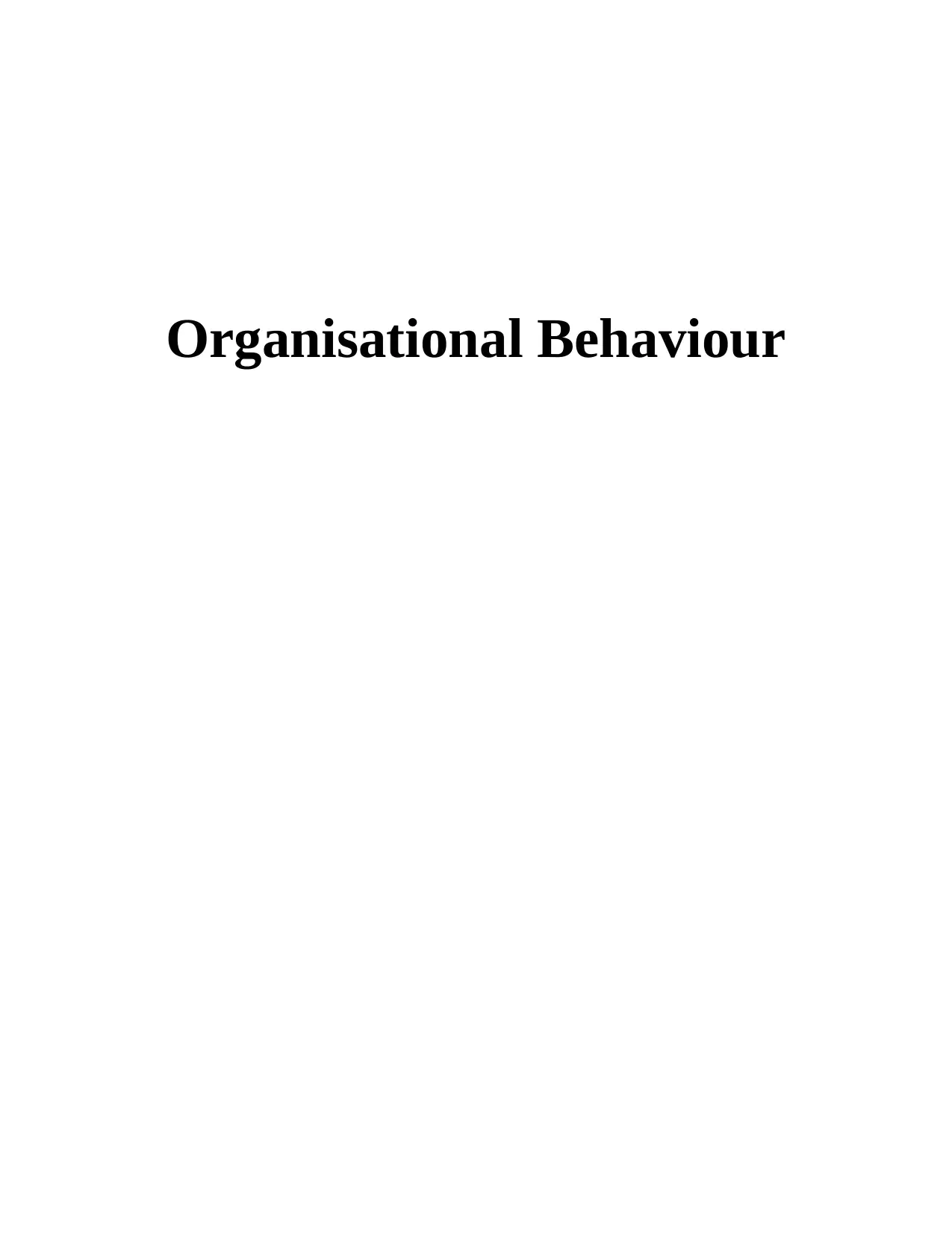
Organisational Behaviour
Paraphrase This Document
Need a fresh take? Get an instant paraphrase of this document with our AI Paraphraser
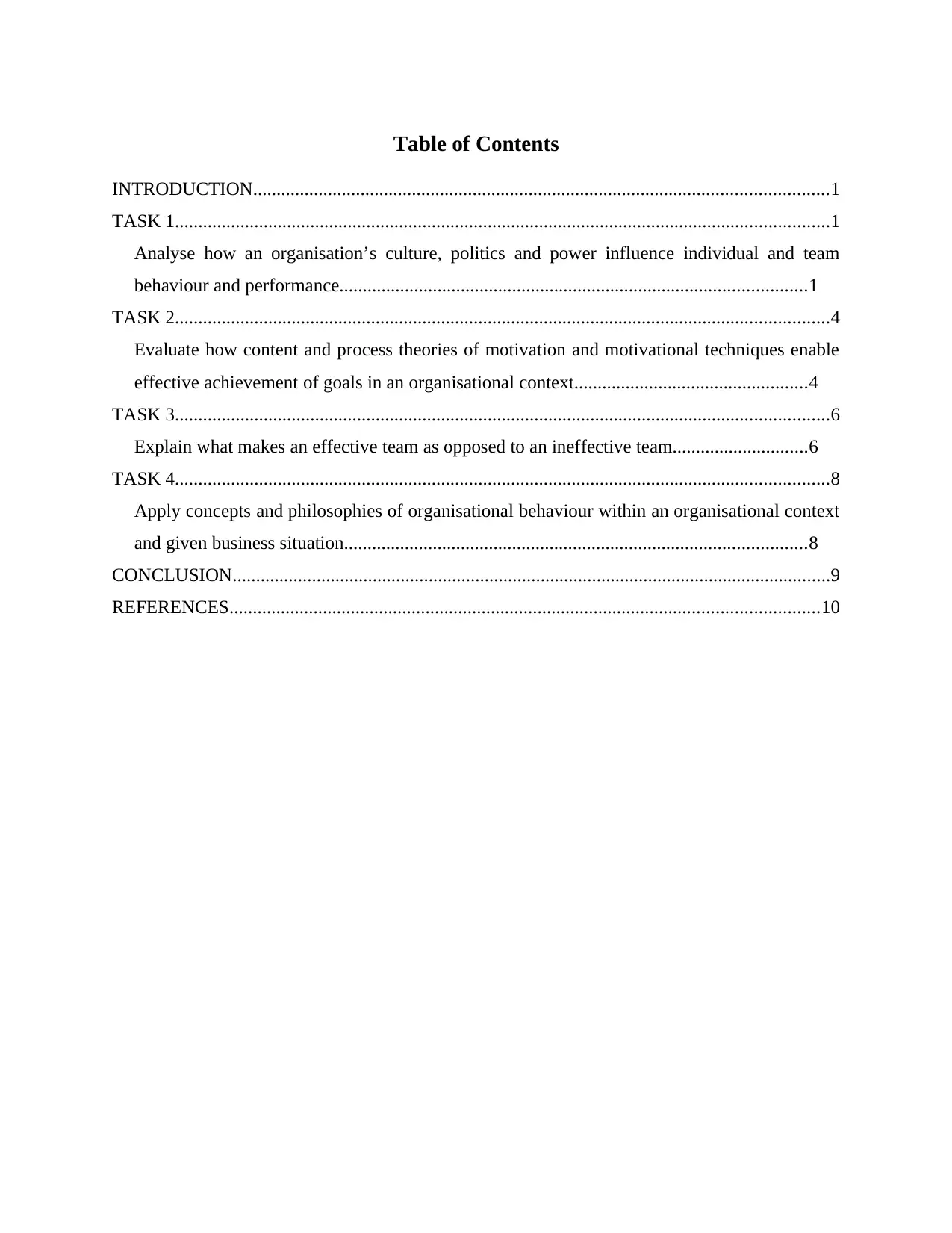
Table of Contents
INTRODUCTION...........................................................................................................................1
TASK 1............................................................................................................................................1
Analyse how an organisation’s culture, politics and power influence individual and team
behaviour and performance....................................................................................................1
TASK 2............................................................................................................................................4
Evaluate how content and process theories of motivation and motivational techniques enable
effective achievement of goals in an organisational context..................................................4
TASK 3............................................................................................................................................6
Explain what makes an effective team as opposed to an ineffective team.............................6
TASK 4............................................................................................................................................8
Apply concepts and philosophies of organisational behaviour within an organisational context
and given business situation...................................................................................................8
CONCLUSION................................................................................................................................9
REFERENCES..............................................................................................................................10
INTRODUCTION...........................................................................................................................1
TASK 1............................................................................................................................................1
Analyse how an organisation’s culture, politics and power influence individual and team
behaviour and performance....................................................................................................1
TASK 2............................................................................................................................................4
Evaluate how content and process theories of motivation and motivational techniques enable
effective achievement of goals in an organisational context..................................................4
TASK 3............................................................................................................................................6
Explain what makes an effective team as opposed to an ineffective team.............................6
TASK 4............................................................................................................................................8
Apply concepts and philosophies of organisational behaviour within an organisational context
and given business situation...................................................................................................8
CONCLUSION................................................................................................................................9
REFERENCES..............................................................................................................................10
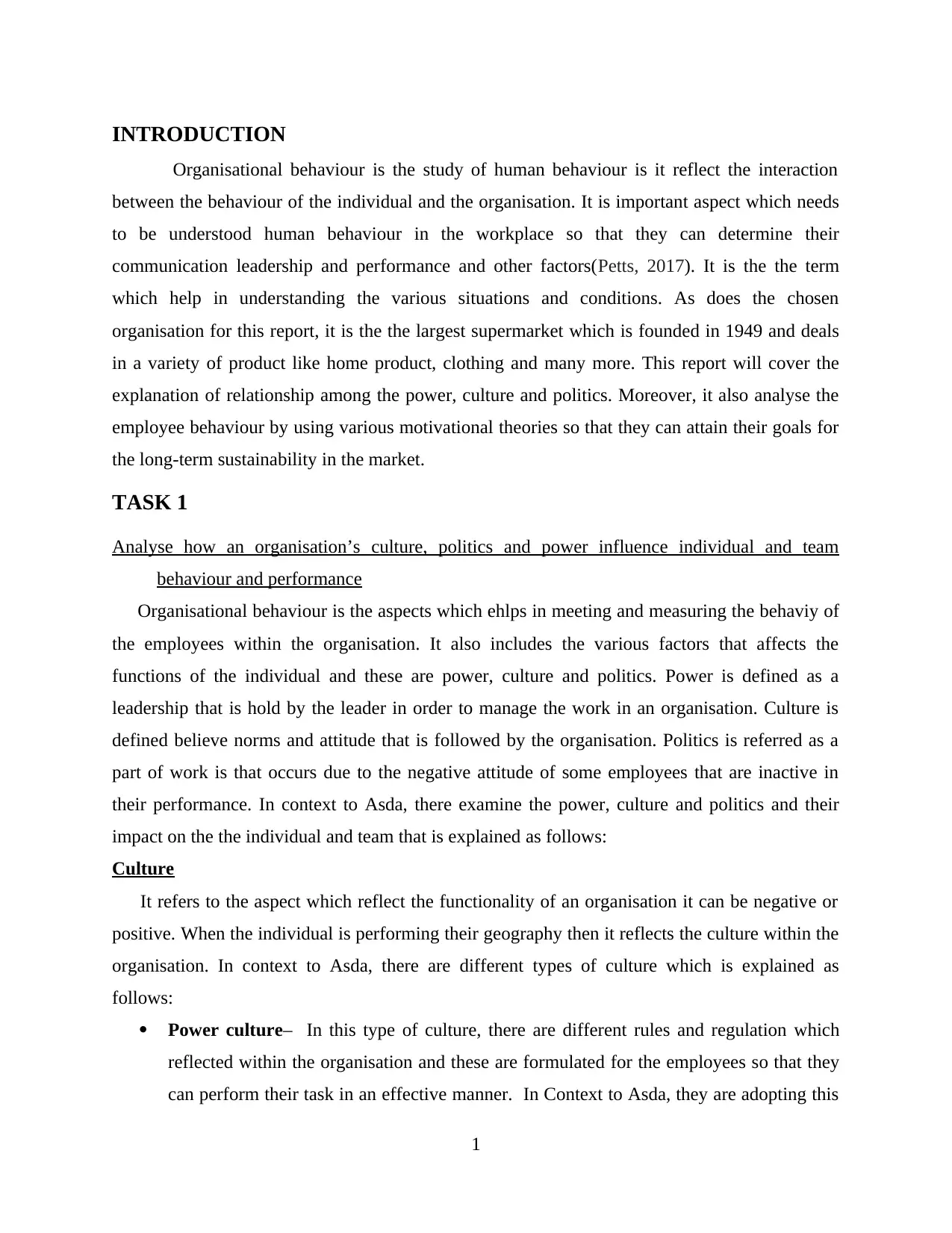
INTRODUCTION
Organisational behaviour is the study of human behaviour is it reflect the interaction
between the behaviour of the individual and the organisation. It is important aspect which needs
to be understood human behaviour in the workplace so that they can determine their
communication leadership and performance and other factors(Petts, 2017). It is the the term
which help in understanding the various situations and conditions. As does the chosen
organisation for this report, it is the the largest supermarket which is founded in 1949 and deals
in a variety of product like home product, clothing and many more. This report will cover the
explanation of relationship among the power, culture and politics. Moreover, it also analyse the
employee behaviour by using various motivational theories so that they can attain their goals for
the long-term sustainability in the market.
TASK 1
Analyse how an organisation’s culture, politics and power influence individual and team
behaviour and performance
Organisational behaviour is the aspects which ehlps in meeting and measuring the behaviy of
the employees within the organisation. It also includes the various factors that affects the
functions of the individual and these are power, culture and politics. Power is defined as a
leadership that is hold by the leader in order to manage the work in an organisation. Culture is
defined believe norms and attitude that is followed by the organisation. Politics is referred as a
part of work is that occurs due to the negative attitude of some employees that are inactive in
their performance. In context to Asda, there examine the power, culture and politics and their
impact on the the individual and team that is explained as follows:
Culture
It refers to the aspect which reflect the functionality of an organisation it can be negative or
positive. When the individual is performing their geography then it reflects the culture within the
organisation. In context to Asda, there are different types of culture which is explained as
follows:
Power culture– In this type of culture, there are different rules and regulation which
reflected within the organisation and these are formulated for the employees so that they
can perform their task in an effective manner. In Context to Asda, they are adopting this
1
Organisational behaviour is the study of human behaviour is it reflect the interaction
between the behaviour of the individual and the organisation. It is important aspect which needs
to be understood human behaviour in the workplace so that they can determine their
communication leadership and performance and other factors(Petts, 2017). It is the the term
which help in understanding the various situations and conditions. As does the chosen
organisation for this report, it is the the largest supermarket which is founded in 1949 and deals
in a variety of product like home product, clothing and many more. This report will cover the
explanation of relationship among the power, culture and politics. Moreover, it also analyse the
employee behaviour by using various motivational theories so that they can attain their goals for
the long-term sustainability in the market.
TASK 1
Analyse how an organisation’s culture, politics and power influence individual and team
behaviour and performance
Organisational behaviour is the aspects which ehlps in meeting and measuring the behaviy of
the employees within the organisation. It also includes the various factors that affects the
functions of the individual and these are power, culture and politics. Power is defined as a
leadership that is hold by the leader in order to manage the work in an organisation. Culture is
defined believe norms and attitude that is followed by the organisation. Politics is referred as a
part of work is that occurs due to the negative attitude of some employees that are inactive in
their performance. In context to Asda, there examine the power, culture and politics and their
impact on the the individual and team that is explained as follows:
Culture
It refers to the aspect which reflect the functionality of an organisation it can be negative or
positive. When the individual is performing their geography then it reflects the culture within the
organisation. In context to Asda, there are different types of culture which is explained as
follows:
Power culture– In this type of culture, there are different rules and regulation which
reflected within the organisation and these are formulated for the employees so that they
can perform their task in an effective manner. In Context to Asda, they are adopting this
1
⊘ This is a preview!⊘
Do you want full access?
Subscribe today to unlock all pages.

Trusted by 1+ million students worldwide
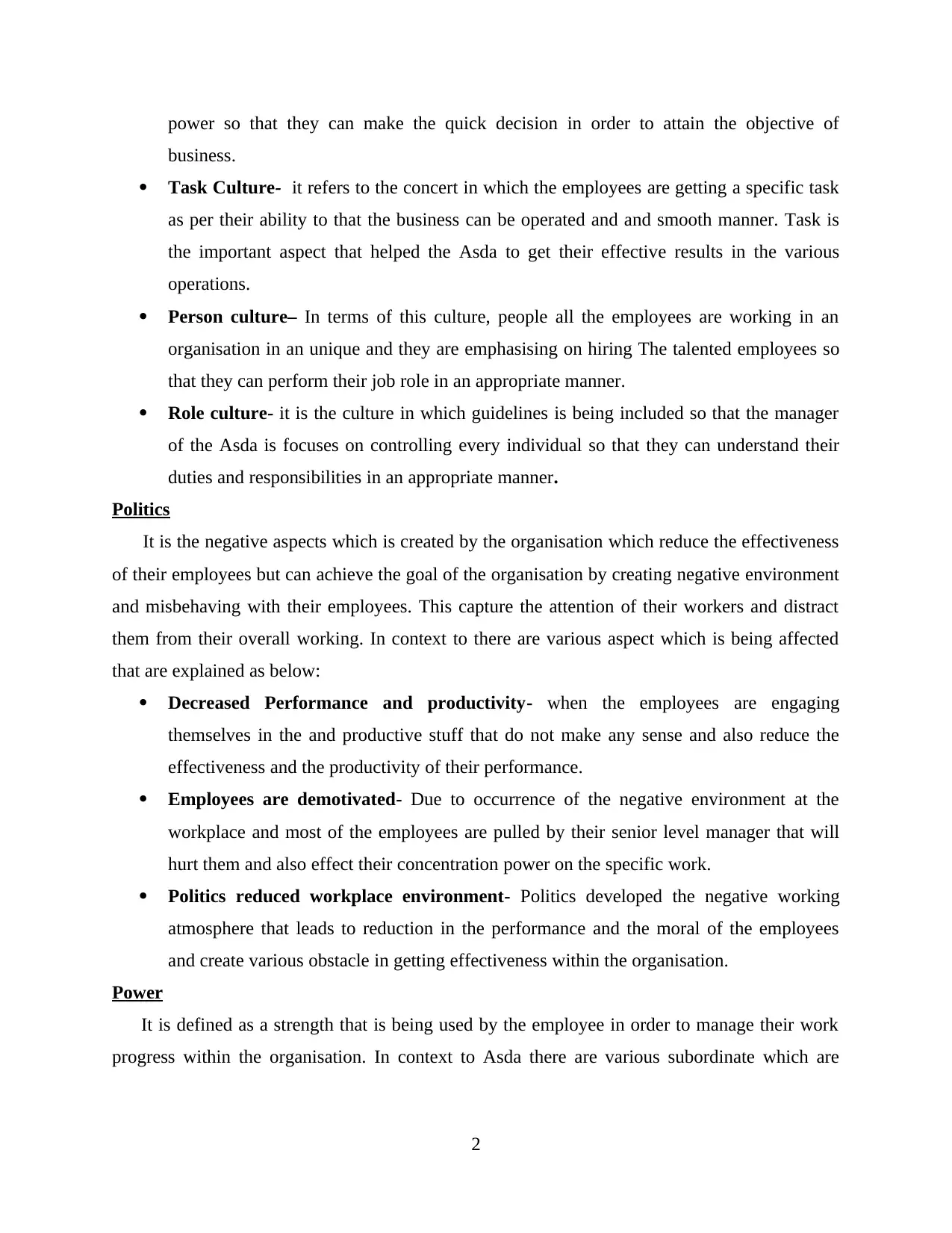
power so that they can make the quick decision in order to attain the objective of
business.
Task Culture- it refers to the concert in which the employees are getting a specific task
as per their ability to that the business can be operated and and smooth manner. Task is
the important aspect that helped the Asda to get their effective results in the various
operations.
Person culture– In terms of this culture, people all the employees are working in an
organisation in an unique and they are emphasising on hiring The talented employees so
that they can perform their job role in an appropriate manner.
Role culture- it is the culture in which guidelines is being included so that the manager
of the Asda is focuses on controlling every individual so that they can understand their
duties and responsibilities in an appropriate manner.
Politics
It is the negative aspects which is created by the organisation which reduce the effectiveness
of their employees but can achieve the goal of the organisation by creating negative environment
and misbehaving with their employees. This capture the attention of their workers and distract
them from their overall working. In context to there are various aspect which is being affected
that are explained as below:
Decreased Performance and productivity- when the employees are engaging
themselves in the and productive stuff that do not make any sense and also reduce the
effectiveness and the productivity of their performance.
Employees are demotivated- Due to occurrence of the negative environment at the
workplace and most of the employees are pulled by their senior level manager that will
hurt them and also effect their concentration power on the specific work.
Politics reduced workplace environment- Politics developed the negative working
atmosphere that leads to reduction in the performance and the moral of the employees
and create various obstacle in getting effectiveness within the organisation.
Power
It is defined as a strength that is being used by the employee in order to manage their work
progress within the organisation. In context to Asda there are various subordinate which are
2
business.
Task Culture- it refers to the concert in which the employees are getting a specific task
as per their ability to that the business can be operated and and smooth manner. Task is
the important aspect that helped the Asda to get their effective results in the various
operations.
Person culture– In terms of this culture, people all the employees are working in an
organisation in an unique and they are emphasising on hiring The talented employees so
that they can perform their job role in an appropriate manner.
Role culture- it is the culture in which guidelines is being included so that the manager
of the Asda is focuses on controlling every individual so that they can understand their
duties and responsibilities in an appropriate manner.
Politics
It is the negative aspects which is created by the organisation which reduce the effectiveness
of their employees but can achieve the goal of the organisation by creating negative environment
and misbehaving with their employees. This capture the attention of their workers and distract
them from their overall working. In context to there are various aspect which is being affected
that are explained as below:
Decreased Performance and productivity- when the employees are engaging
themselves in the and productive stuff that do not make any sense and also reduce the
effectiveness and the productivity of their performance.
Employees are demotivated- Due to occurrence of the negative environment at the
workplace and most of the employees are pulled by their senior level manager that will
hurt them and also effect their concentration power on the specific work.
Politics reduced workplace environment- Politics developed the negative working
atmosphere that leads to reduction in the performance and the moral of the employees
and create various obstacle in getting effectiveness within the organisation.
Power
It is defined as a strength that is being used by the employee in order to manage their work
progress within the organisation. In context to Asda there are various subordinate which are
2
Paraphrase This Document
Need a fresh take? Get an instant paraphrase of this document with our AI Paraphraser
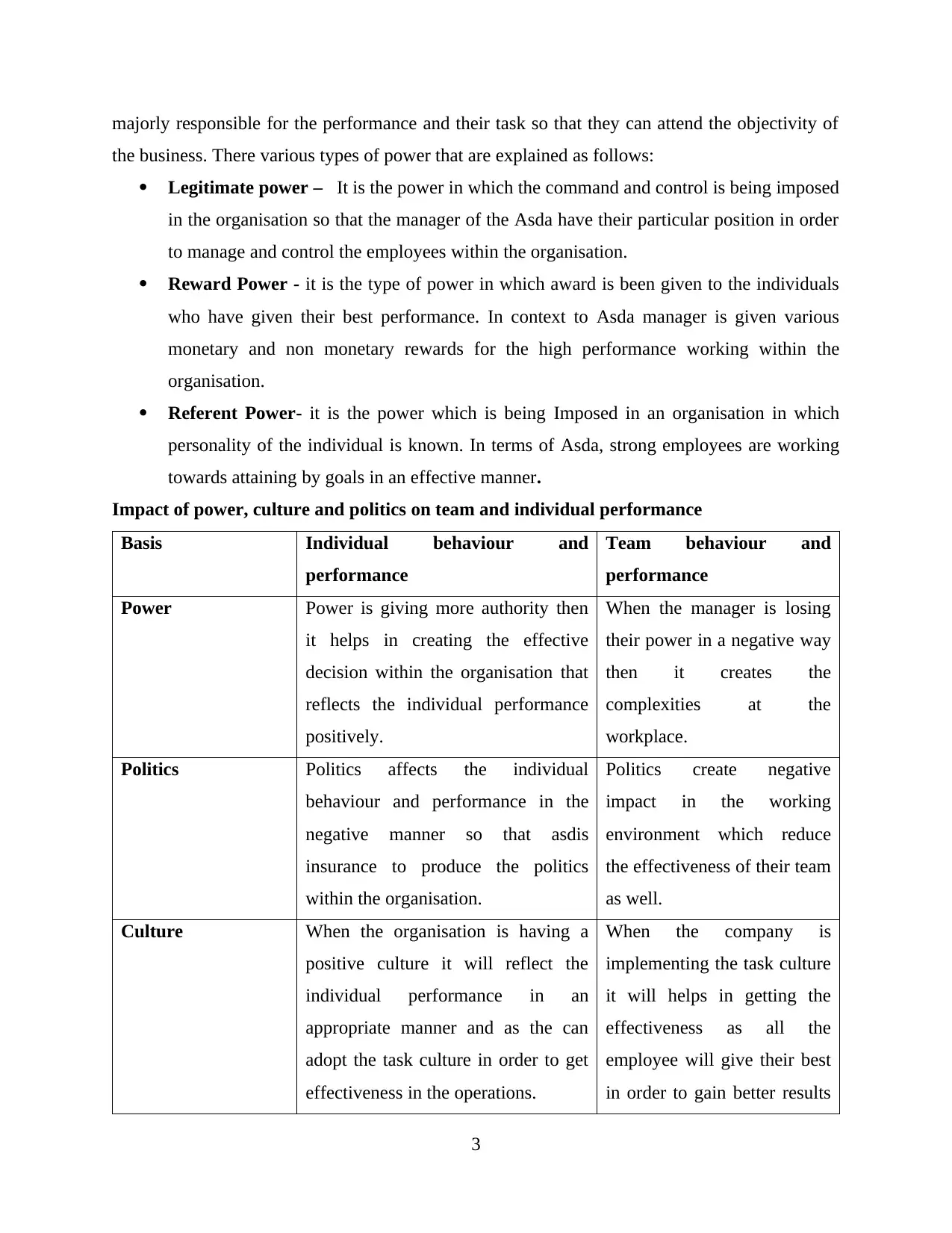
majorly responsible for the performance and their task so that they can attend the objectivity of
the business. There various types of power that are explained as follows:
Legitimate power – It is the power in which the command and control is being imposed
in the organisation so that the manager of the Asda have their particular position in order
to manage and control the employees within the organisation.
Reward Power - it is the type of power in which award is been given to the individuals
who have given their best performance. In context to Asda manager is given various
monetary and non monetary rewards for the high performance working within the
organisation.
Referent Power- it is the power which is being Imposed in an organisation in which
personality of the individual is known. In terms of Asda, strong employees are working
towards attaining by goals in an effective manner.
Impact of power, culture and politics on team and individual performance
Basis Individual behaviour and
performance
Team behaviour and
performance
Power Power is giving more authority then
it helps in creating the effective
decision within the organisation that
reflects the individual performance
positively.
When the manager is losing
their power in a negative way
then it creates the
complexities at the
workplace.
Politics Politics affects the individual
behaviour and performance in the
negative manner so that asdis
insurance to produce the politics
within the organisation.
Politics create negative
impact in the working
environment which reduce
the effectiveness of their team
as well.
Culture When the organisation is having a
positive culture it will reflect the
individual performance in an
appropriate manner and as the can
adopt the task culture in order to get
effectiveness in the operations.
When the company is
implementing the task culture
it will helps in getting the
effectiveness as all the
employee will give their best
in order to gain better results
3
the business. There various types of power that are explained as follows:
Legitimate power – It is the power in which the command and control is being imposed
in the organisation so that the manager of the Asda have their particular position in order
to manage and control the employees within the organisation.
Reward Power - it is the type of power in which award is been given to the individuals
who have given their best performance. In context to Asda manager is given various
monetary and non monetary rewards for the high performance working within the
organisation.
Referent Power- it is the power which is being Imposed in an organisation in which
personality of the individual is known. In terms of Asda, strong employees are working
towards attaining by goals in an effective manner.
Impact of power, culture and politics on team and individual performance
Basis Individual behaviour and
performance
Team behaviour and
performance
Power Power is giving more authority then
it helps in creating the effective
decision within the organisation that
reflects the individual performance
positively.
When the manager is losing
their power in a negative way
then it creates the
complexities at the
workplace.
Politics Politics affects the individual
behaviour and performance in the
negative manner so that asdis
insurance to produce the politics
within the organisation.
Politics create negative
impact in the working
environment which reduce
the effectiveness of their team
as well.
Culture When the organisation is having a
positive culture it will reflect the
individual performance in an
appropriate manner and as the can
adopt the task culture in order to get
effectiveness in the operations.
When the company is
implementing the task culture
it will helps in getting the
effectiveness as all the
employee will give their best
in order to gain better results
3
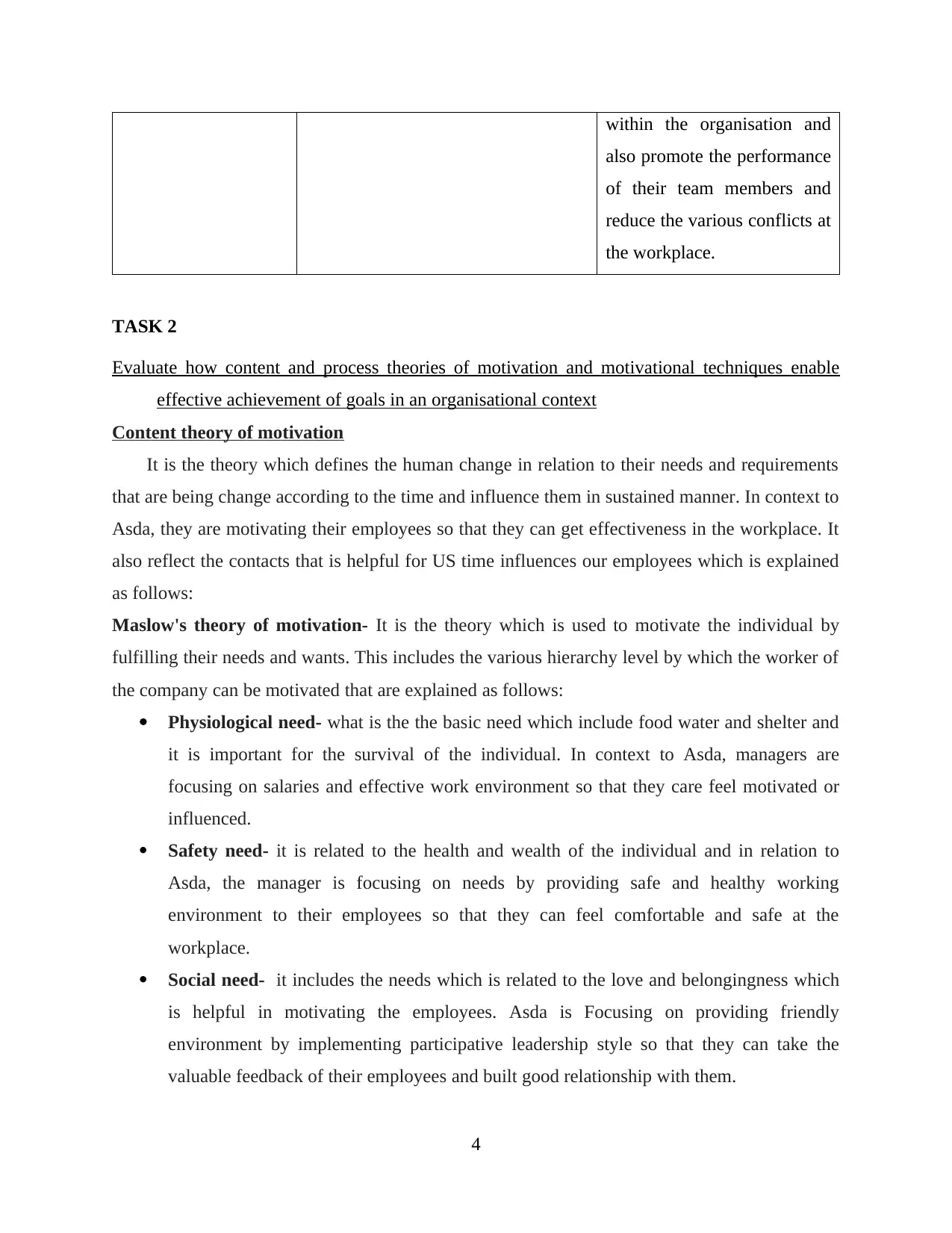
within the organisation and
also promote the performance
of their team members and
reduce the various conflicts at
the workplace.
TASK 2
Evaluate how content and process theories of motivation and motivational techniques enable
effective achievement of goals in an organisational context
Content theory of motivation
It is the theory which defines the human change in relation to their needs and requirements
that are being change according to the time and influence them in sustained manner. In context to
Asda, they are motivating their employees so that they can get effectiveness in the workplace. It
also reflect the contacts that is helpful for US time influences our employees which is explained
as follows:
Maslow's theory of motivation- It is the theory which is used to motivate the individual by
fulfilling their needs and wants. This includes the various hierarchy level by which the worker of
the company can be motivated that are explained as follows:
Physiological need- what is the the basic need which include food water and shelter and
it is important for the survival of the individual. In context to Asda, managers are
focusing on salaries and effective work environment so that they care feel motivated or
influenced.
Safety need- it is related to the health and wealth of the individual and in relation to
Asda, the manager is focusing on needs by providing safe and healthy working
environment to their employees so that they can feel comfortable and safe at the
workplace.
Social need- it includes the needs which is related to the love and belongingness which
is helpful in motivating the employees. Asda is Focusing on providing friendly
environment by implementing participative leadership style so that they can take the
valuable feedback of their employees and built good relationship with them.
4
also promote the performance
of their team members and
reduce the various conflicts at
the workplace.
TASK 2
Evaluate how content and process theories of motivation and motivational techniques enable
effective achievement of goals in an organisational context
Content theory of motivation
It is the theory which defines the human change in relation to their needs and requirements
that are being change according to the time and influence them in sustained manner. In context to
Asda, they are motivating their employees so that they can get effectiveness in the workplace. It
also reflect the contacts that is helpful for US time influences our employees which is explained
as follows:
Maslow's theory of motivation- It is the theory which is used to motivate the individual by
fulfilling their needs and wants. This includes the various hierarchy level by which the worker of
the company can be motivated that are explained as follows:
Physiological need- what is the the basic need which include food water and shelter and
it is important for the survival of the individual. In context to Asda, managers are
focusing on salaries and effective work environment so that they care feel motivated or
influenced.
Safety need- it is related to the health and wealth of the individual and in relation to
Asda, the manager is focusing on needs by providing safe and healthy working
environment to their employees so that they can feel comfortable and safe at the
workplace.
Social need- it includes the needs which is related to the love and belongingness which
is helpful in motivating the employees. Asda is Focusing on providing friendly
environment by implementing participative leadership style so that they can take the
valuable feedback of their employees and built good relationship with them.
4
⊘ This is a preview!⊘
Do you want full access?
Subscribe today to unlock all pages.

Trusted by 1+ million students worldwide
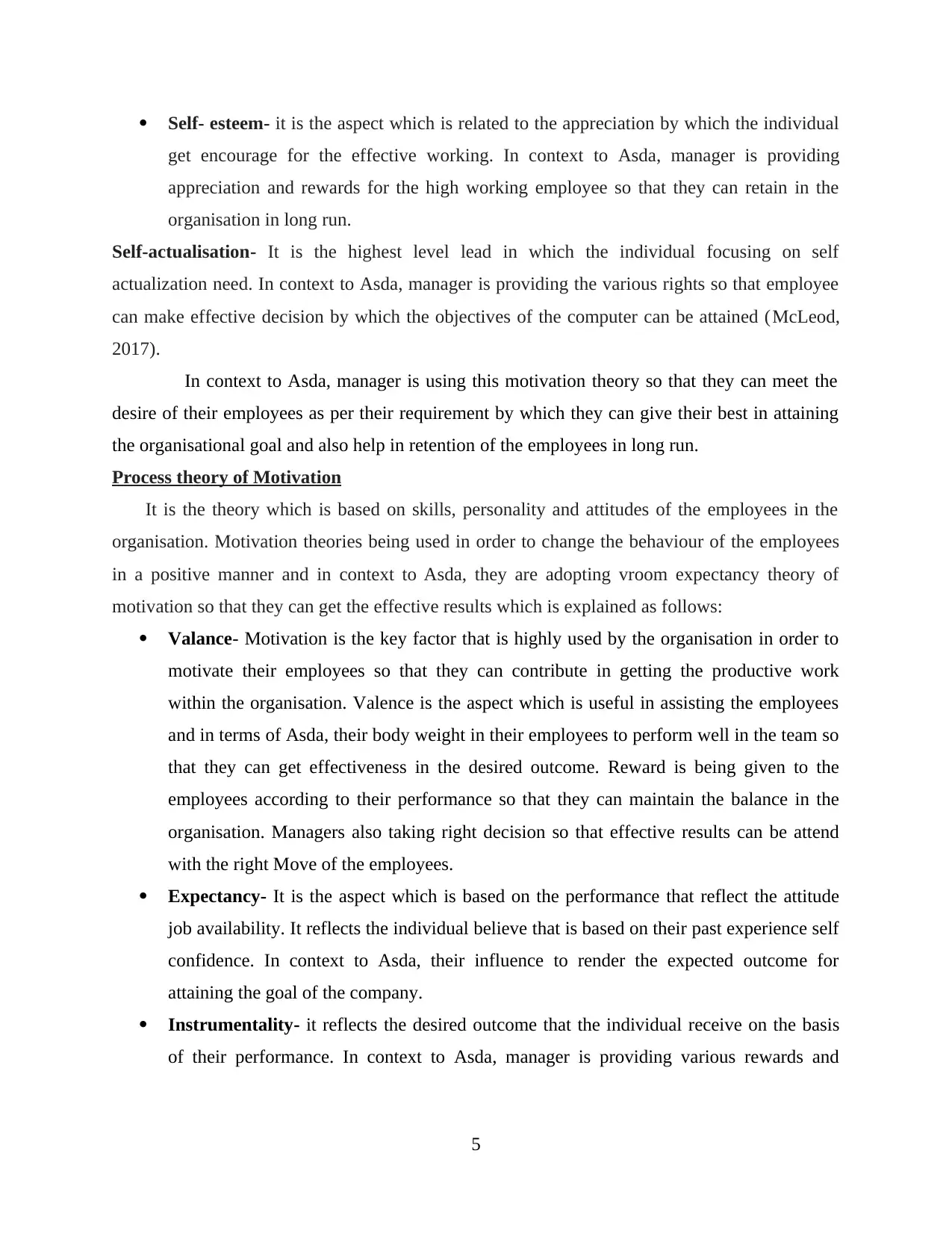
Self- esteem- it is the aspect which is related to the appreciation by which the individual
get encourage for the effective working. In context to Asda, manager is providing
appreciation and rewards for the high working employee so that they can retain in the
organisation in long run.
Self-actualisation- It is the highest level lead in which the individual focusing on self
actualization need. In context to Asda, manager is providing the various rights so that employee
can make effective decision by which the objectives of the computer can be attained (McLeod,
2017).
In context to Asda, manager is using this motivation theory so that they can meet the
desire of their employees as per their requirement by which they can give their best in attaining
the organisational goal and also help in retention of the employees in long run.
Process theory of Motivation
It is the theory which is based on skills, personality and attitudes of the employees in the
organisation. Motivation theories being used in order to change the behaviour of the employees
in a positive manner and in context to Asda, they are adopting vroom expectancy theory of
motivation so that they can get the effective results which is explained as follows:
Valance- Motivation is the key factor that is highly used by the organisation in order to
motivate their employees so that they can contribute in getting the productive work
within the organisation. Valence is the aspect which is useful in assisting the employees
and in terms of Asda, their body weight in their employees to perform well in the team so
that they can get effectiveness in the desired outcome. Reward is being given to the
employees according to their performance so that they can maintain the balance in the
organisation. Managers also taking right decision so that effective results can be attend
with the right Move of the employees.
Expectancy- It is the aspect which is based on the performance that reflect the attitude
job availability. It reflects the individual believe that is based on their past experience self
confidence. In context to Asda, their influence to render the expected outcome for
attaining the goal of the company.
Instrumentality- it reflects the desired outcome that the individual receive on the basis
of their performance. In context to Asda, manager is providing various rewards and
5
get encourage for the effective working. In context to Asda, manager is providing
appreciation and rewards for the high working employee so that they can retain in the
organisation in long run.
Self-actualisation- It is the highest level lead in which the individual focusing on self
actualization need. In context to Asda, manager is providing the various rights so that employee
can make effective decision by which the objectives of the computer can be attained (McLeod,
2017).
In context to Asda, manager is using this motivation theory so that they can meet the
desire of their employees as per their requirement by which they can give their best in attaining
the organisational goal and also help in retention of the employees in long run.
Process theory of Motivation
It is the theory which is based on skills, personality and attitudes of the employees in the
organisation. Motivation theories being used in order to change the behaviour of the employees
in a positive manner and in context to Asda, they are adopting vroom expectancy theory of
motivation so that they can get the effective results which is explained as follows:
Valance- Motivation is the key factor that is highly used by the organisation in order to
motivate their employees so that they can contribute in getting the productive work
within the organisation. Valence is the aspect which is useful in assisting the employees
and in terms of Asda, their body weight in their employees to perform well in the team so
that they can get effectiveness in the desired outcome. Reward is being given to the
employees according to their performance so that they can maintain the balance in the
organisation. Managers also taking right decision so that effective results can be attend
with the right Move of the employees.
Expectancy- It is the aspect which is based on the performance that reflect the attitude
job availability. It reflects the individual believe that is based on their past experience self
confidence. In context to Asda, their influence to render the expected outcome for
attaining the goal of the company.
Instrumentality- it reflects the desired outcome that the individual receive on the basis
of their performance. In context to Asda, manager is providing various rewards and
5
Paraphrase This Document
Need a fresh take? Get an instant paraphrase of this document with our AI Paraphraser
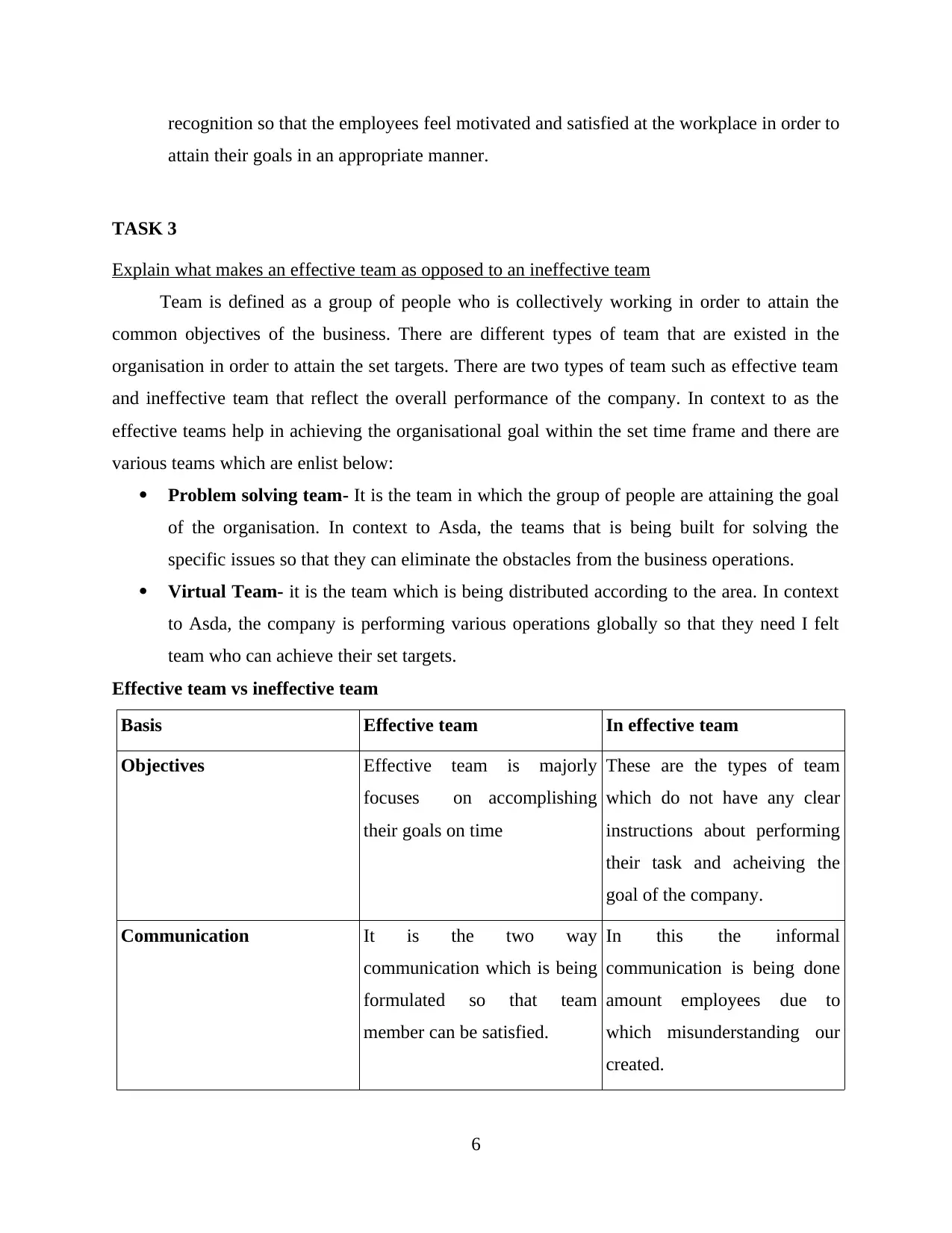
recognition so that the employees feel motivated and satisfied at the workplace in order to
attain their goals in an appropriate manner.
TASK 3
Explain what makes an effective team as opposed to an ineffective team
Team is defined as a group of people who is collectively working in order to attain the
common objectives of the business. There are different types of team that are existed in the
organisation in order to attain the set targets. There are two types of team such as effective team
and ineffective team that reflect the overall performance of the company. In context to as the
effective teams help in achieving the organisational goal within the set time frame and there are
various teams which are enlist below:
Problem solving team- It is the team in which the group of people are attaining the goal
of the organisation. In context to Asda, the teams that is being built for solving the
specific issues so that they can eliminate the obstacles from the business operations.
Virtual Team- it is the team which is being distributed according to the area. In context
to Asda, the company is performing various operations globally so that they need I felt
team who can achieve their set targets.
Effective team vs ineffective team
Basis Effective team In effective team
Objectives Effective team is majorly
focuses on accomplishing
their goals on time
These are the types of team
which do not have any clear
instructions about performing
their task and acheiving the
goal of the company.
Communication It is the two way
communication which is being
formulated so that team
member can be satisfied.
In this the informal
communication is being done
amount employees due to
which misunderstanding our
created.
6
attain their goals in an appropriate manner.
TASK 3
Explain what makes an effective team as opposed to an ineffective team
Team is defined as a group of people who is collectively working in order to attain the
common objectives of the business. There are different types of team that are existed in the
organisation in order to attain the set targets. There are two types of team such as effective team
and ineffective team that reflect the overall performance of the company. In context to as the
effective teams help in achieving the organisational goal within the set time frame and there are
various teams which are enlist below:
Problem solving team- It is the team in which the group of people are attaining the goal
of the organisation. In context to Asda, the teams that is being built for solving the
specific issues so that they can eliminate the obstacles from the business operations.
Virtual Team- it is the team which is being distributed according to the area. In context
to Asda, the company is performing various operations globally so that they need I felt
team who can achieve their set targets.
Effective team vs ineffective team
Basis Effective team In effective team
Objectives Effective team is majorly
focuses on accomplishing
their goals on time
These are the types of team
which do not have any clear
instructions about performing
their task and acheiving the
goal of the company.
Communication It is the two way
communication which is being
formulated so that team
member can be satisfied.
In this the informal
communication is being done
amount employees due to
which misunderstanding our
created.
6
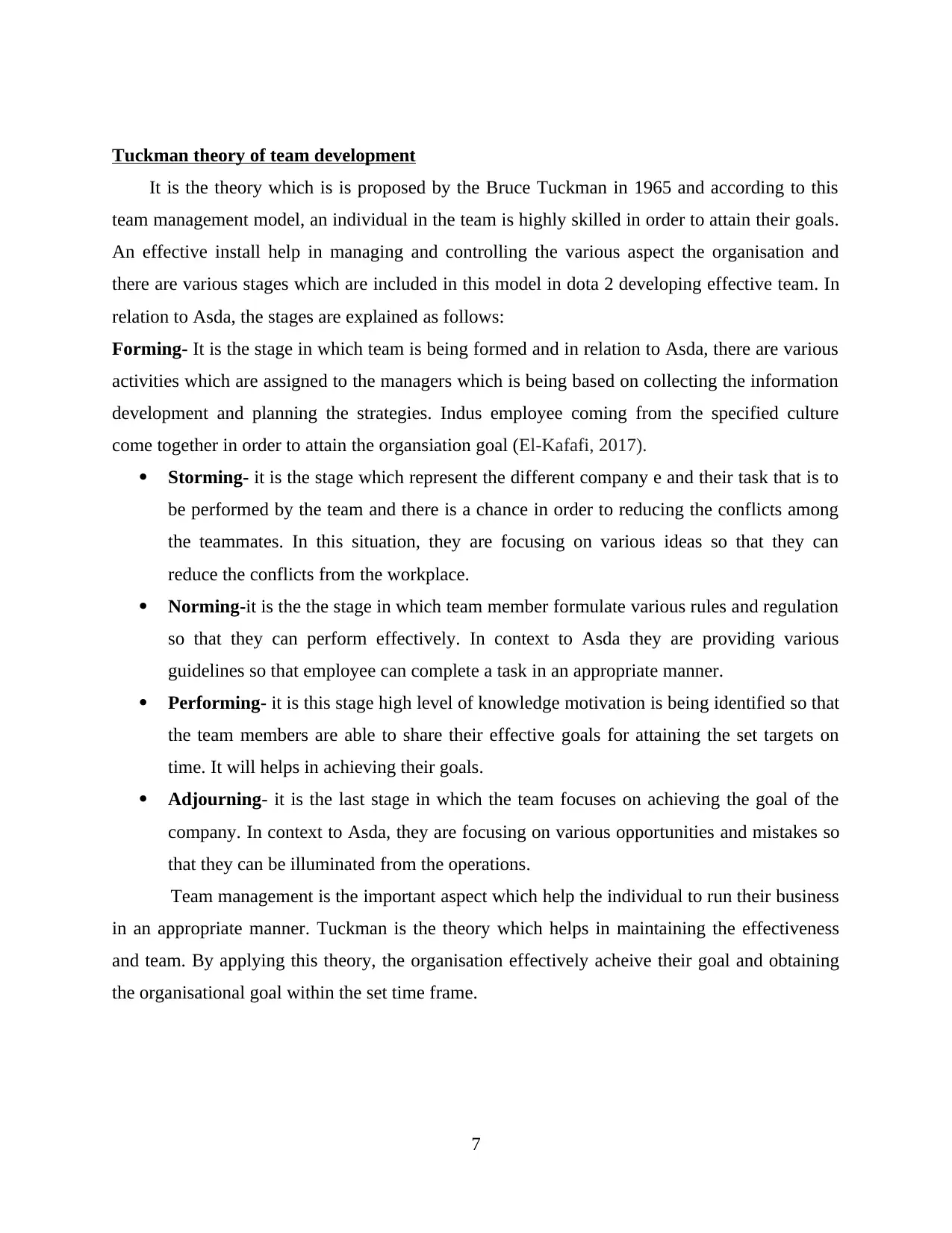
Tuckman theory of team development
It is the theory which is is proposed by the Bruce Tuckman in 1965 and according to this
team management model, an individual in the team is highly skilled in order to attain their goals.
An effective install help in managing and controlling the various aspect the organisation and
there are various stages which are included in this model in dota 2 developing effective team. In
relation to Asda, the stages are explained as follows:
Forming- It is the stage in which team is being formed and in relation to Asda, there are various
activities which are assigned to the managers which is being based on collecting the information
development and planning the strategies. Indus employee coming from the specified culture
come together in order to attain the organsiation goal (El-Kafafi, 2017).
Storming- it is the stage which represent the different company e and their task that is to
be performed by the team and there is a chance in order to reducing the conflicts among
the teammates. In this situation, they are focusing on various ideas so that they can
reduce the conflicts from the workplace.
Norming-it is the the stage in which team member formulate various rules and regulation
so that they can perform effectively. In context to Asda they are providing various
guidelines so that employee can complete a task in an appropriate manner.
Performing- it is this stage high level of knowledge motivation is being identified so that
the team members are able to share their effective goals for attaining the set targets on
time. It will helps in achieving their goals.
Adjourning- it is the last stage in which the team focuses on achieving the goal of the
company. In context to Asda, they are focusing on various opportunities and mistakes so
that they can be illuminated from the operations.
Team management is the important aspect which help the individual to run their business
in an appropriate manner. Tuckman is the theory which helps in maintaining the effectiveness
and team. By applying this theory, the organisation effectively acheive their goal and obtaining
the organisational goal within the set time frame.
7
It is the theory which is is proposed by the Bruce Tuckman in 1965 and according to this
team management model, an individual in the team is highly skilled in order to attain their goals.
An effective install help in managing and controlling the various aspect the organisation and
there are various stages which are included in this model in dota 2 developing effective team. In
relation to Asda, the stages are explained as follows:
Forming- It is the stage in which team is being formed and in relation to Asda, there are various
activities which are assigned to the managers which is being based on collecting the information
development and planning the strategies. Indus employee coming from the specified culture
come together in order to attain the organsiation goal (El-Kafafi, 2017).
Storming- it is the stage which represent the different company e and their task that is to
be performed by the team and there is a chance in order to reducing the conflicts among
the teammates. In this situation, they are focusing on various ideas so that they can
reduce the conflicts from the workplace.
Norming-it is the the stage in which team member formulate various rules and regulation
so that they can perform effectively. In context to Asda they are providing various
guidelines so that employee can complete a task in an appropriate manner.
Performing- it is this stage high level of knowledge motivation is being identified so that
the team members are able to share their effective goals for attaining the set targets on
time. It will helps in achieving their goals.
Adjourning- it is the last stage in which the team focuses on achieving the goal of the
company. In context to Asda, they are focusing on various opportunities and mistakes so
that they can be illuminated from the operations.
Team management is the important aspect which help the individual to run their business
in an appropriate manner. Tuckman is the theory which helps in maintaining the effectiveness
and team. By applying this theory, the organisation effectively acheive their goal and obtaining
the organisational goal within the set time frame.
7
⊘ This is a preview!⊘
Do you want full access?
Subscribe today to unlock all pages.

Trusted by 1+ million students worldwide
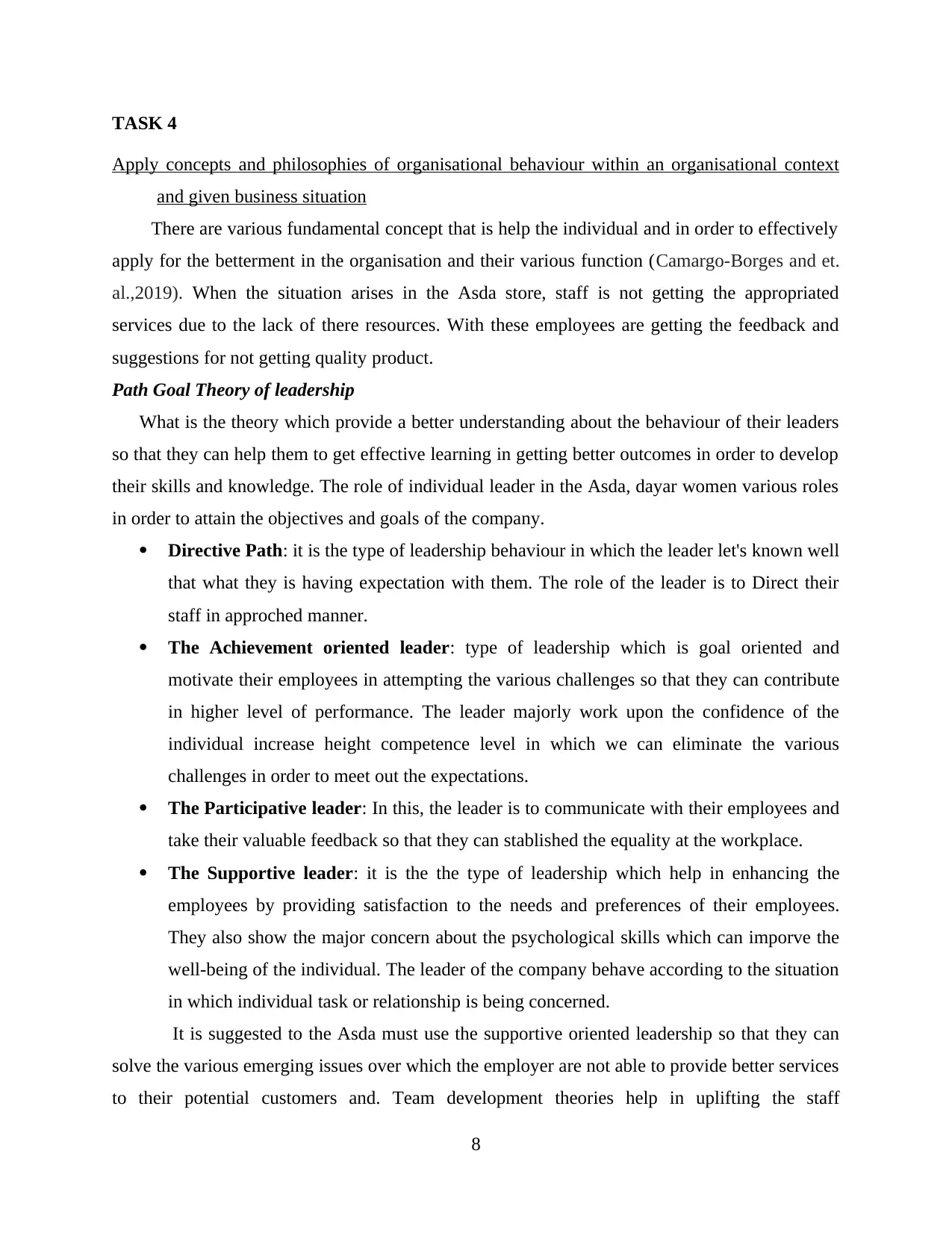
TASK 4
Apply concepts and philosophies of organisational behaviour within an organisational context
and given business situation
There are various fundamental concept that is help the individual and in order to effectively
apply for the betterment in the organisation and their various function (Camargo-Borges and et.
al.,2019). When the situation arises in the Asda store, staff is not getting the appropriated
services due to the lack of there resources. With these employees are getting the feedback and
suggestions for not getting quality product.
Path Goal Theory of leadership
What is the theory which provide a better understanding about the behaviour of their leaders
so that they can help them to get effective learning in getting better outcomes in order to develop
their skills and knowledge. The role of individual leader in the Asda, dayar women various roles
in order to attain the objectives and goals of the company.
Directive Path: it is the type of leadership behaviour in which the leader let's known well
that what they is having expectation with them. The role of the leader is to Direct their
staff in approched manner.
The Achievement oriented leader: type of leadership which is goal oriented and
motivate their employees in attempting the various challenges so that they can contribute
in higher level of performance. The leader majorly work upon the confidence of the
individual increase height competence level in which we can eliminate the various
challenges in order to meet out the expectations.
The Participative leader: In this, the leader is to communicate with their employees and
take their valuable feedback so that they can stablished the equality at the workplace.
The Supportive leader: it is the the type of leadership which help in enhancing the
employees by providing satisfaction to the needs and preferences of their employees.
They also show the major concern about the psychological skills which can imporve the
well-being of the individual. The leader of the company behave according to the situation
in which individual task or relationship is being concerned.
It is suggested to the Asda must use the supportive oriented leadership so that they can
solve the various emerging issues over which the employer are not able to provide better services
to their potential customers and. Team development theories help in uplifting the staff
8
Apply concepts and philosophies of organisational behaviour within an organisational context
and given business situation
There are various fundamental concept that is help the individual and in order to effectively
apply for the betterment in the organisation and their various function (Camargo-Borges and et.
al.,2019). When the situation arises in the Asda store, staff is not getting the appropriated
services due to the lack of there resources. With these employees are getting the feedback and
suggestions for not getting quality product.
Path Goal Theory of leadership
What is the theory which provide a better understanding about the behaviour of their leaders
so that they can help them to get effective learning in getting better outcomes in order to develop
their skills and knowledge. The role of individual leader in the Asda, dayar women various roles
in order to attain the objectives and goals of the company.
Directive Path: it is the type of leadership behaviour in which the leader let's known well
that what they is having expectation with them. The role of the leader is to Direct their
staff in approched manner.
The Achievement oriented leader: type of leadership which is goal oriented and
motivate their employees in attempting the various challenges so that they can contribute
in higher level of performance. The leader majorly work upon the confidence of the
individual increase height competence level in which we can eliminate the various
challenges in order to meet out the expectations.
The Participative leader: In this, the leader is to communicate with their employees and
take their valuable feedback so that they can stablished the equality at the workplace.
The Supportive leader: it is the the type of leadership which help in enhancing the
employees by providing satisfaction to the needs and preferences of their employees.
They also show the major concern about the psychological skills which can imporve the
well-being of the individual. The leader of the company behave according to the situation
in which individual task or relationship is being concerned.
It is suggested to the Asda must use the supportive oriented leadership so that they can
solve the various emerging issues over which the employer are not able to provide better services
to their potential customers and. Team development theories help in uplifting the staff
8
Paraphrase This Document
Need a fresh take? Get an instant paraphrase of this document with our AI Paraphraser
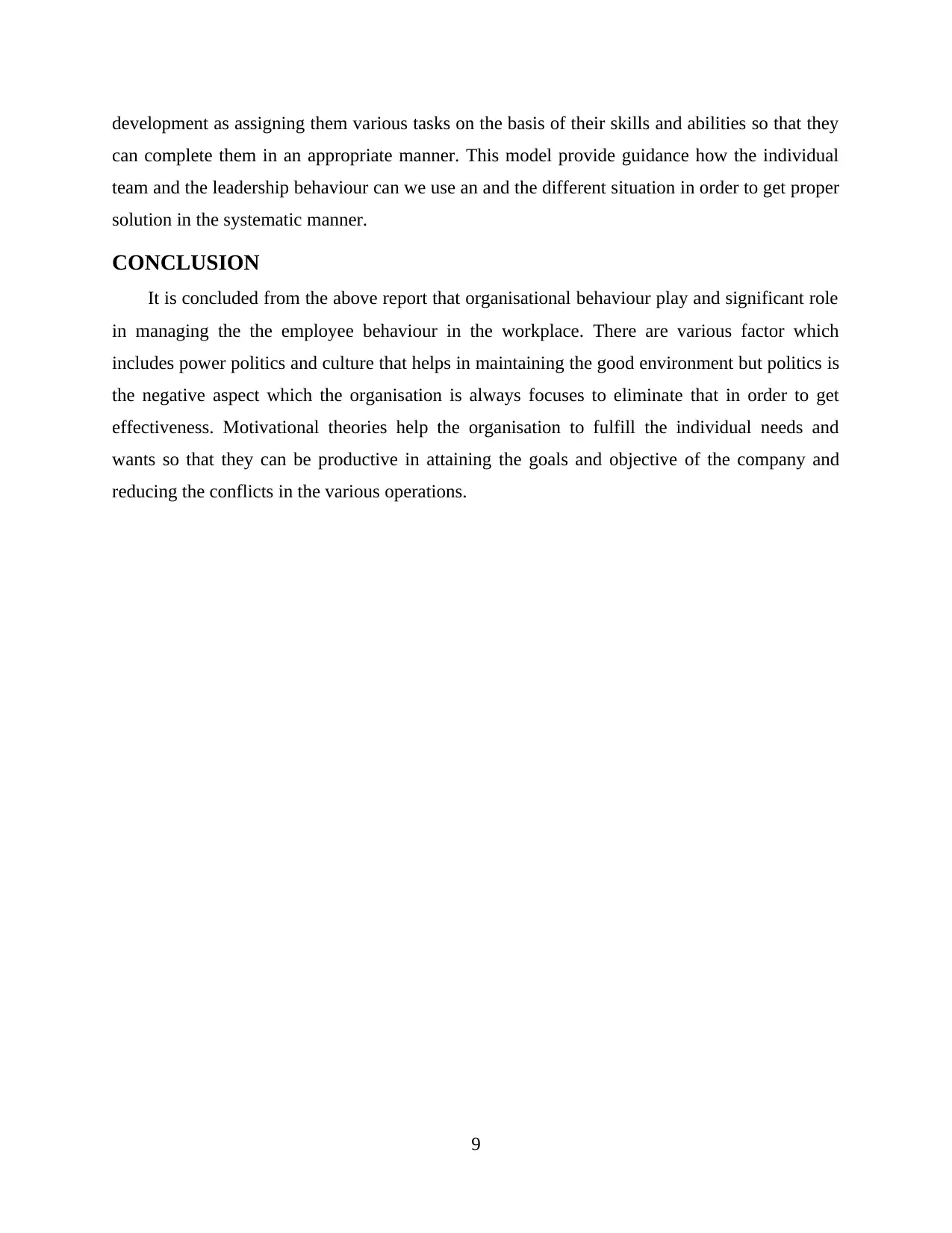
development as assigning them various tasks on the basis of their skills and abilities so that they
can complete them in an appropriate manner. This model provide guidance how the individual
team and the leadership behaviour can we use an and the different situation in order to get proper
solution in the systematic manner.
CONCLUSION
It is concluded from the above report that organisational behaviour play and significant role
in managing the the employee behaviour in the workplace. There are various factor which
includes power politics and culture that helps in maintaining the good environment but politics is
the negative aspect which the organisation is always focuses to eliminate that in order to get
effectiveness. Motivational theories help the organisation to fulfill the individual needs and
wants so that they can be productive in attaining the goals and objective of the company and
reducing the conflicts in the various operations.
9
can complete them in an appropriate manner. This model provide guidance how the individual
team and the leadership behaviour can we use an and the different situation in order to get proper
solution in the systematic manner.
CONCLUSION
It is concluded from the above report that organisational behaviour play and significant role
in managing the the employee behaviour in the workplace. There are various factor which
includes power politics and culture that helps in maintaining the good environment but politics is
the negative aspect which the organisation is always focuses to eliminate that in order to get
effectiveness. Motivational theories help the organisation to fulfill the individual needs and
wants so that they can be productive in attaining the goals and objective of the company and
reducing the conflicts in the various operations.
9
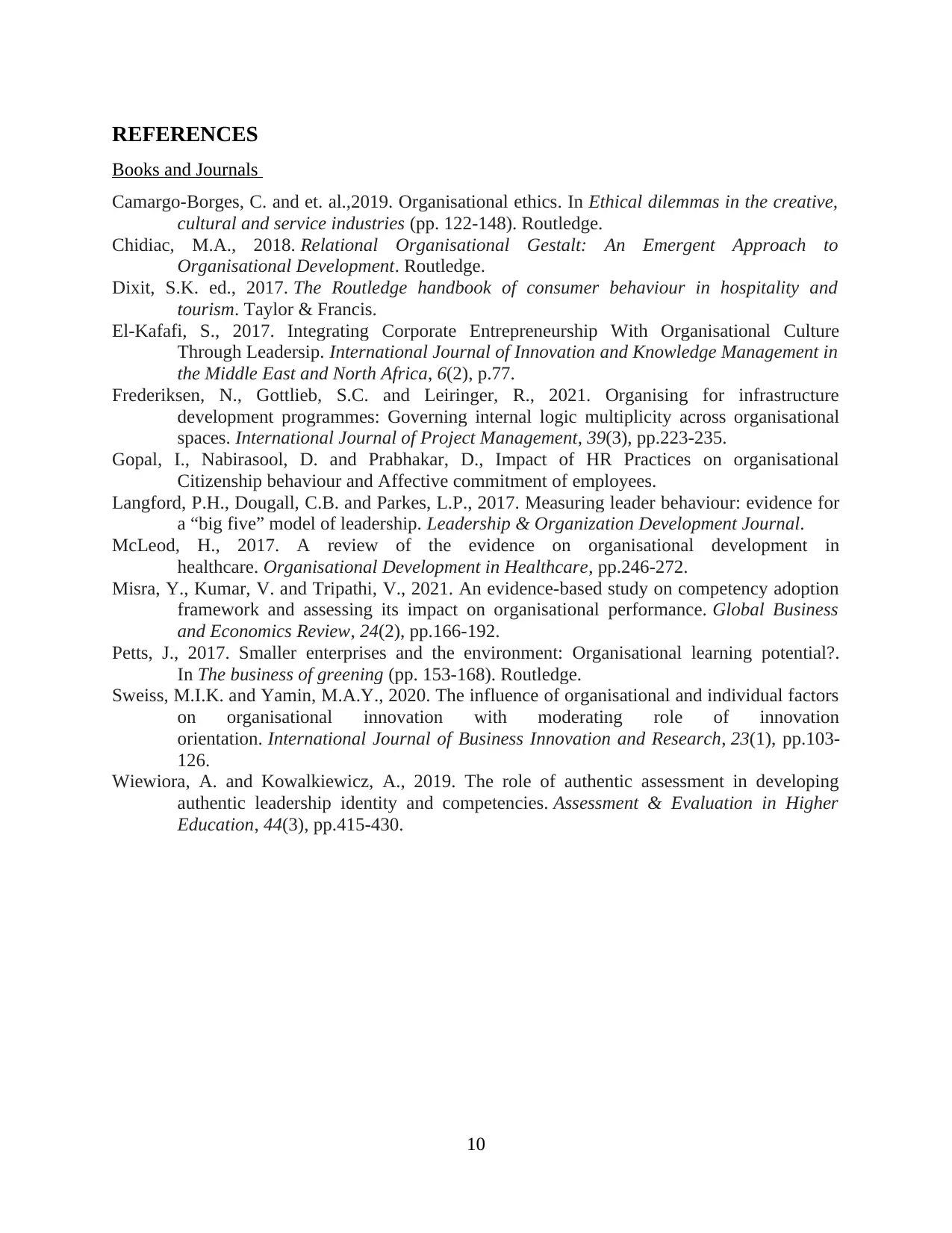
REFERENCES
Books and Journals
Camargo-Borges, C. and et. al.,2019. Organisational ethics. In Ethical dilemmas in the creative,
cultural and service industries (pp. 122-148). Routledge.
Chidiac, M.A., 2018. Relational Organisational Gestalt: An Emergent Approach to
Organisational Development. Routledge.
Dixit, S.K. ed., 2017. The Routledge handbook of consumer behaviour in hospitality and
tourism. Taylor & Francis.
El-Kafafi, S., 2017. Integrating Corporate Entrepreneurship With Organisational Culture
Through Leadersip. International Journal of Innovation and Knowledge Management in
the Middle East and North Africa, 6(2), p.77.
Frederiksen, N., Gottlieb, S.C. and Leiringer, R., 2021. Organising for infrastructure
development programmes: Governing internal logic multiplicity across organisational
spaces. International Journal of Project Management, 39(3), pp.223-235.
Gopal, I., Nabirasool, D. and Prabhakar, D., Impact of HR Practices on organisational
Citizenship behaviour and Affective commitment of employees.
Langford, P.H., Dougall, C.B. and Parkes, L.P., 2017. Measuring leader behaviour: evidence for
a “big five” model of leadership. Leadership & Organization Development Journal.
McLeod, H., 2017. A review of the evidence on organisational development in
healthcare. Organisational Development in Healthcare, pp.246-272.
Misra, Y., Kumar, V. and Tripathi, V., 2021. An evidence-based study on competency adoption
framework and assessing its impact on organisational performance. Global Business
and Economics Review, 24(2), pp.166-192.
Petts, J., 2017. Smaller enterprises and the environment: Organisational learning potential?.
In The business of greening (pp. 153-168). Routledge.
Sweiss, M.I.K. and Yamin, M.A.Y., 2020. The influence of organisational and individual factors
on organisational innovation with moderating role of innovation
orientation. International Journal of Business Innovation and Research, 23(1), pp.103-
126.
Wiewiora, A. and Kowalkiewicz, A., 2019. The role of authentic assessment in developing
authentic leadership identity and competencies. Assessment & Evaluation in Higher
Education, 44(3), pp.415-430.
10
Books and Journals
Camargo-Borges, C. and et. al.,2019. Organisational ethics. In Ethical dilemmas in the creative,
cultural and service industries (pp. 122-148). Routledge.
Chidiac, M.A., 2018. Relational Organisational Gestalt: An Emergent Approach to
Organisational Development. Routledge.
Dixit, S.K. ed., 2017. The Routledge handbook of consumer behaviour in hospitality and
tourism. Taylor & Francis.
El-Kafafi, S., 2017. Integrating Corporate Entrepreneurship With Organisational Culture
Through Leadersip. International Journal of Innovation and Knowledge Management in
the Middle East and North Africa, 6(2), p.77.
Frederiksen, N., Gottlieb, S.C. and Leiringer, R., 2021. Organising for infrastructure
development programmes: Governing internal logic multiplicity across organisational
spaces. International Journal of Project Management, 39(3), pp.223-235.
Gopal, I., Nabirasool, D. and Prabhakar, D., Impact of HR Practices on organisational
Citizenship behaviour and Affective commitment of employees.
Langford, P.H., Dougall, C.B. and Parkes, L.P., 2017. Measuring leader behaviour: evidence for
a “big five” model of leadership. Leadership & Organization Development Journal.
McLeod, H., 2017. A review of the evidence on organisational development in
healthcare. Organisational Development in Healthcare, pp.246-272.
Misra, Y., Kumar, V. and Tripathi, V., 2021. An evidence-based study on competency adoption
framework and assessing its impact on organisational performance. Global Business
and Economics Review, 24(2), pp.166-192.
Petts, J., 2017. Smaller enterprises and the environment: Organisational learning potential?.
In The business of greening (pp. 153-168). Routledge.
Sweiss, M.I.K. and Yamin, M.A.Y., 2020. The influence of organisational and individual factors
on organisational innovation with moderating role of innovation
orientation. International Journal of Business Innovation and Research, 23(1), pp.103-
126.
Wiewiora, A. and Kowalkiewicz, A., 2019. The role of authentic assessment in developing
authentic leadership identity and competencies. Assessment & Evaluation in Higher
Education, 44(3), pp.415-430.
10
⊘ This is a preview!⊘
Do you want full access?
Subscribe today to unlock all pages.

Trusted by 1+ million students worldwide
1 out of 12
Related Documents
Your All-in-One AI-Powered Toolkit for Academic Success.
+13062052269
info@desklib.com
Available 24*7 on WhatsApp / Email
![[object Object]](/_next/static/media/star-bottom.7253800d.svg)
Unlock your academic potential
Copyright © 2020–2026 A2Z Services. All Rights Reserved. Developed and managed by ZUCOL.





